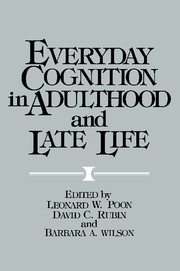Book contents
- Frontmatter
- Contents
- List of contributors
- Preface
- Part I Adult cognitive abilities in the laboratory and in real-life settings: Basic theoretical and methodological issues
- Part IA Systematic approaches to laboratory and real-world research
- Part IB Combining laboratory and real-world research
- Part II Cognition in adulthood and late life: Findings in real-life settings
- Part IIA Everyday cognitive abilities
- Part IIB Concomitant influences
- 21 Motivation and aging
- 22 Questionnaire research on metamemory and aging: Issues of structure and function
- 23 The importance of awareness in memory aging
- 24 Age and expertise: Responding to Talland's challenge
- 25 World-knowledge systems
- 26 Comments on aging memory and its everyday operations
- Part III Cognitive enhancement and aging: Clinical and educational applications
- Part IIIA Issues and perspectives
- Part IIIB Enhancement approaches
- Part IIIC Designing programs for cognitive rehabilitation
- Subject index
- Author index
24 - Age and expertise: Responding to Talland's challenge
Published online by Cambridge University Press: 05 October 2013
- Frontmatter
- Contents
- List of contributors
- Preface
- Part I Adult cognitive abilities in the laboratory and in real-life settings: Basic theoretical and methodological issues
- Part IA Systematic approaches to laboratory and real-world research
- Part IB Combining laboratory and real-world research
- Part II Cognition in adulthood and late life: Findings in real-life settings
- Part IIA Everyday cognitive abilities
- Part IIB Concomitant influences
- 21 Motivation and aging
- 22 Questionnaire research on metamemory and aging: Issues of structure and function
- 23 The importance of awareness in memory aging
- 24 Age and expertise: Responding to Talland's challenge
- 25 World-knowledge systems
- 26 Comments on aging memory and its everyday operations
- Part III Cognitive enhancement and aging: Clinical and educational applications
- Part IIIA Issues and perspectives
- Part IIIB Enhancement approaches
- Part IIIC Designing programs for cognitive rehabilitation
- Subject index
- Author index
Summary
This chapter is intended to serve as a tutorial on expertise. As a result, it represents a very selective review of studies in order to sketch what I believe to be the main trends in the study of expertise as they may apply to research on aging. For a fine general overview of this topic, see Hoyer (1985). To start with, it is useful to recall a point raised by George Talland about 20 years ago. Talland noted a feature of aging that many investigators have since commented on, namely, that there are many older people in our society who function well, and some who function in expert fashion. He put it this way:
I am still puzzled by the contrast of the athlete who, at thirty, is too old for the championship and the maestro, who, at eighty, can treat us to a memorable performance on the concert stage…. Are our aged masters freaks of nature, paragons of self-discipline, or do they demonstrate the inadequacy of our present notions about the effects of age on human capacities? (Talland, 1965, p. 558)
I shall try to respond to Talland's challenge by assessing what we have learned in recent years about expertise and how the joint study of age and expertise can shed new light on issues important to both fields.
- Type
- Chapter
- Information
- Everyday Cognition in Adulthood and Late Life , pp. 437 - 456Publisher: Cambridge University PressPrint publication year: 1989
- 17
- Cited by



